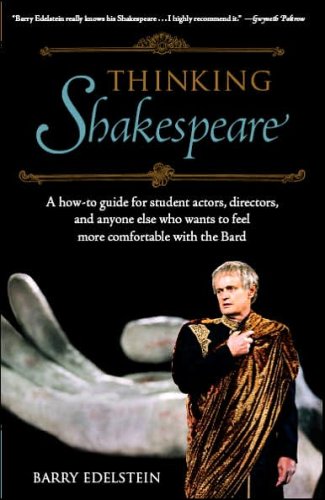Top 7 recommendation thinking shakespeare
Finding the best thinking shakespeare suitable for your needs isnt easy. With hundreds of choices can distract you. Knowing whats bad and whats good can be something of a minefield. In this article, weve done the hard work for you.
1. Thinking Shakespeare (Revised Edition): A working guide for actors, directors, studentsand anyone else interested in the Bard
Description
Thinking Shakespeare gives theater artists practical advice about how to make Shakespeares words feel spontaneous, passionate, and real. Based on Barry Edelsteins thirty-year career directing Shakespeares plays, this book provides the tools that artists need to fully understand and express the power of Shakespeares language.
2. Thinking Shakespeare: A How-to Guide for Student Actors, Directors, and Anyone Else Who Wants to Feel More Comfortable With the Bard
Description
Thinking Shakespeare: A How-to Guide for Student Actors, Directors, and Anyone Else Who Wants to Feel More Comfortable With the Bard3. Thinking with Shakespeare: Essays on Politics and Life
Description
What is a person? What company do people keep with animals, plants, and things? What are their rights? To whom are they obligated? Such questionsbearing fundamentally on the shared meaning of politics and lifeanimate Shakespearean drama, yet their urgency has been obscured by historicist approaches to literature.
Julia Reinhard Lupton gently dislodges Shakespeares plays from their historical confines in order to pursue their universal implications. From Petruchios animals and Kates laundry to Hamlets friends and Calibans childhood, Lupton here restages thinking in Shakespeare as an embodied act of consent, cure, and care. Rather than putting the plays in service of an ideological program, Thinking with Shakespeare encourages readers to ponder matters of shared concern with the playwright by their side. In a landscape populated by she-doctors, minor monsters, bankrupted hosts, and faithful cupbearers, Shakespeare tests what it means to consider our humanity fully. Taking her cue from Hannah Arendt, Lupton reads Shakespeare for fresh insights into everything from housekeeping and animal husbandry to biopower and political theology.
4. Bardisms: Shakespeare for All Occasions by Barry Edelstein (2010-02-02)
5. Shakespeare Thinking (Shakespeare Now!)
Feature
Used Book in Good ConditionDescription
Shakespearean thinking is always dynamic: thinking that happens in the living moment of its performance, in quickly passing process.This book offers a model of human mentality that can be shown through the dense immediacy of dramatic thinking, as embodied above all in Shakespeare's working method. Shakespeare Thinking discusses the positioning of Shakespeare as the paradigm of fully human mental creativity from the Romantics to the latest neurological experiments which show that Shakespeare can reveal new understandings of the hard-wiring of the human brain, and the sheer sudden electricity of its synaptic development.
6. Early Modern Actors and Shakespeare's Theatre: Thinking with the Body
Description
What skills did Shakespeare's actors bring to their craft? How do these skills differ from those of contemporary actors? Early Modern Actors and Shakespeare's Theatre: Thinking with the Body examines the 'toolkit' of the early modern player and suggests new readings of the plays of Shakespeare and his contemporaries through the lens of their many skills.
Theatre is an ephemeral medium. Little remains to us of the plays of Shakespeare and his contemporaries: some printed texts, scattered documents and records, and a few scraps of description, praise, and detraction. Because most of what survives are printed playbooks, students of English theatre find it easy to forget that much of what happened on the early modern stage took place within the gaps of written language: the implicit or explicit calls for fights, dances, military formations, feats of physical skill, song, and clowning. Theatre historians and textual editors have often ignored or denigrated such moments, seeing them merely as extraneous amusements or signs that the text has been 'corrupted' by actors. This book argues that recapturing a positive account of the skills and expertise of the early modern players will result in a more capacious understanding of the nature of theatricality in the period.
7. Shakespeare in Hindsight: Counterfactual Thinking and Shakespearean Tragedy (Edinburgh Critical Studies in Shakespeare and Philosophy)










Recent Comments